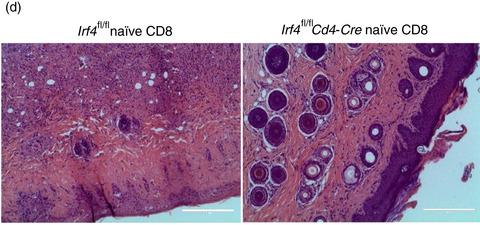当前位置:
X-MOL 学术
›
Immunology
›
论文详情
Our official English website, www.x-mol.net, welcomes your
feedback! (Note: you will need to create a separate account there.)
Interferon regulatory factor 4 deficiency in CD8+ T cells abrogates terminal effector differentiation and promotes transplant acceptance.
Immunology ( IF 4.9 ) Pub Date : 2020-09-06 , DOI: 10.1111/imm.13258 Dawei Zou 1, 2 , Jinfei Fu 2 , Zhiyong Guo 1 , Wenhao Chen 2, 3
Immunology ( IF 4.9 ) Pub Date : 2020-09-06 , DOI: 10.1111/imm.13258 Dawei Zou 1, 2 , Jinfei Fu 2 , Zhiyong Guo 1 , Wenhao Chen 2, 3
Affiliation

|
Allogeneic CD8+ cytotoxic T cells play an essential role in rejecting transplanted allografts, but how their effector function is regulated on a transcriptional level remains unclear. Herein, we investigate the role of interferon regulatory factor 4 (IRF4) in controlling CD8+ T‐cell function in response to transplant. B6.Rag1−/− mice were adoptively transferred with CD8+ T cells isolated from either Irf4fl/flCd4‐Cre (T‐cell‐specific Irf4‐deficient) or Irf4fl/fl control mice, followed by BALB/c skin transplantation. Recipients that received Irf4‐deficient CD8+ T cells permanently accepted the skin allografts, whereas recipients that received control CD8+ T cells acutely rejected the transplanted skins. Mechanistically, compared with the transferred control CD8+ T cells in B6.Rag1−/− recipients, the transferred Irf4‐deficient CD8+ T cells lost the capacity to differentiate into CD127−KLRG1+ terminal effector cells, barely produced effector cytokines and cytotoxic molecules (e.g. IL‐2, IFN‐γ, TNF‐α, granzyme A and granzyme B), and displayed defect in proliferative capacity, evident by their decreased Ki67 expression and lower frequencies. Moreover, the transferred Irf4‐deficient CD8+ T cells displayed low expression of transcription factors ID2 and T‐bet that govern the terminal effector T‐cell programmes, and high expression of transcription factor TCF1 that maintains the naïve‐memory T‐cell programmes. Hence, IRF4 deficiency in CD8+ T cells abrogates their terminal effector differentiation and promotes transplant acceptance. These findings suggest that targeting IRF4 expression represents an attractive and promising therapeutic approach for inducing transplant acceptance.
中文翻译:

CD8+ T 细胞中的干扰素调节因子 4 缺乏会消除末端效应器分化并促进移植接受。
同种异体 CD8 +细胞毒性 T 细胞在排斥移植的同种异体移植物中起重要作用,但它们的效应子功能如何在转录水平上受到调节仍不清楚。在此,我们研究了干扰素调节因子 4 (IRF4) 在控制 CD8 + T 细胞功能以响应移植的作用。B6. Rag1 -/-小鼠被过继转移从Irf4 fl/fl Cd4 - Cre(T 细胞特异性Irf4 缺陷型)或Irf4 fl/fl对照小鼠分离的CD8 + T 细胞,然后进行 BALB/c 皮肤移植。收到Irf4 的收件人‐缺陷型 CD8 + T 细胞永久接受同种异体皮肤移植,而接受对照 CD8 + T 细胞的受体则强烈排斥移植的皮肤。在机制上,与B6 中转移的对照 CD8 + T 细胞相比。Rag1 -/-受体,转移的Irf4 缺陷型CD8 + T 细胞失去分化为 CD127 - KLRG1 + 的能力末端效应细胞,几乎不产生效应细胞因子和细胞毒性分子(如 IL-2、IFN-γ、TNF-α、颗粒酶 A 和颗粒酶 B),并表现出增殖能力缺陷,其 Ki67 表达降低和频率较低。此外,转移的Irf4 缺陷型CD8 + T 细胞显示出控制末端效应 T 细胞程序的转录因子 ID2 和 T-bet 的低表达,以及维持初始记忆 T 细胞程序的转录因子 TCF1 的高表达。因此,CD8 + 中的IRF4 缺乏T 细胞消除其末端效应器分化并促进移植接受。这些发现表明,靶向 IRF4 表达代表了一种有吸引力且有前景的诱导移植接受的治疗方法。
更新日期:2020-09-06
中文翻译:

CD8+ T 细胞中的干扰素调节因子 4 缺乏会消除末端效应器分化并促进移植接受。
同种异体 CD8 +细胞毒性 T 细胞在排斥移植的同种异体移植物中起重要作用,但它们的效应子功能如何在转录水平上受到调节仍不清楚。在此,我们研究了干扰素调节因子 4 (IRF4) 在控制 CD8 + T 细胞功能以响应移植的作用。B6. Rag1 -/-小鼠被过继转移从Irf4 fl/fl Cd4 - Cre(T 细胞特异性Irf4 缺陷型)或Irf4 fl/fl对照小鼠分离的CD8 + T 细胞,然后进行 BALB/c 皮肤移植。收到Irf4 的收件人‐缺陷型 CD8 + T 细胞永久接受同种异体皮肤移植,而接受对照 CD8 + T 细胞的受体则强烈排斥移植的皮肤。在机制上,与B6 中转移的对照 CD8 + T 细胞相比。Rag1 -/-受体,转移的Irf4 缺陷型CD8 + T 细胞失去分化为 CD127 - KLRG1 + 的能力末端效应细胞,几乎不产生效应细胞因子和细胞毒性分子(如 IL-2、IFN-γ、TNF-α、颗粒酶 A 和颗粒酶 B),并表现出增殖能力缺陷,其 Ki67 表达降低和频率较低。此外,转移的Irf4 缺陷型CD8 + T 细胞显示出控制末端效应 T 细胞程序的转录因子 ID2 和 T-bet 的低表达,以及维持初始记忆 T 细胞程序的转录因子 TCF1 的高表达。因此,CD8 + 中的IRF4 缺乏T 细胞消除其末端效应器分化并促进移植接受。这些发现表明,靶向 IRF4 表达代表了一种有吸引力且有前景的诱导移植接受的治疗方法。









































 京公网安备 11010802027423号
京公网安备 11010802027423号